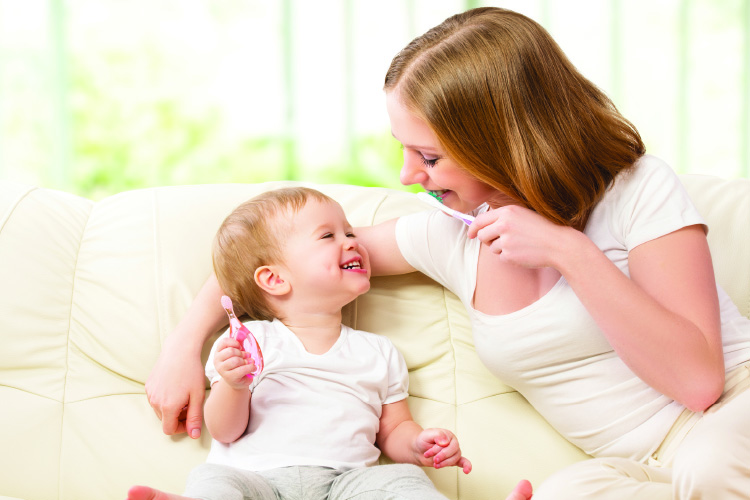Pregnancy is accompanied by complex physical and physiological changes, which may have an adverse effect on oral well-being. When the baby comes along, oral health is just as important for the both of you. Read on for tips on maintaining good oral health.
Good oral health contributes to your overall health and well-being. This is especially important when you are pregnant. Dental hygiene along with dental cleanings and periodical dental exams during pregnancy are not only safe, but also recommended.
Rising hormonal levels during pregnancy causes your gums to swell, bleed, and trap food. These would cause increased gum irritation. Preventive dental work while you are pregnant is vital in order to avoid oral infections such as gum disease, which has been associated with premature birth. It is beneficial for pregnant women to seek appropriate and timely oral health care.
Evidence suggests that most infants and young children acquire caries-causing bacteria from their mothers. By encouraging healthy oral health habits amongst pregnant mothers, this may reduce the transmission of dental-related bacteria from mothers to infants and young children. Thus, the onset of oral conditions or problems resulting from dental diseases can be delayed or prevented.
Table of Contents
Oral care during pregnancy
Use a soft bristled toothbrush. Brush your teeth with fluoridated toothpaste twice a day for at least two minutes each time. Floss everytime you brush your teeth. Replace your toothbrush every three to four months, or more often if there are frayed bristles. Do not share your toothbrush. Rinse with fluoridated, alcohol-free mouthwash to lower the acidity (pH) in your mouth. After eating, chew xylitol-containing gum or mints, which can help reduce bacteria that causes tooth decay.
If you have morning sickness, rinse your mouth with a teaspoon of baking soda in a cup of water after vomiting to stop acid from attacking your teeth.
Eat a well-balanced, nutritious diet with fruits, vegetables, whole-grain products, dairy products, and protein-rich food. It is also advisable to minimize taking food and beverages containing high sugar content. Drink water or milk instead.
Dental treatments while pregnant
Professional cleaning can be carried out at any time during your pregnancy. Aggressive treatments like periodontal surgery should be postponed until after delivery. In the case of emergency dental treatment while pregnant, you should receive treatment if it is necessary to ease your pain, prevent infection or decrease stress on you and your foetus. Your dentist should consult with your obstetrician if he or she has questions about the safety of medicines or anaesthesia.
Dental work such as cavity fillings, crowns, root canal or tooth extraction should be carried out to reduce the probability of infection. It is ideal to have dental work done during your second trimester. Elective treatments like teeth whitening should also be postponed until after delivery.
Lidocaine is the most commonly used drug for dental work. Lidocaine can cross the placenta after administration. The amount of anaesthesia administered should be as little as possible, but still enough to make you comfortable. The amount of stress on you and the baby is reduced when you are comfortable.
Dental work also often requires antibiotics to prevent or treat infections. Certain antibiotics such as penicillin, amoxicillin, and clindamycin, can be prescribed after your procedure.
Dental x-rays during pregnancy
Advances in technology have made dental X-rays much safer. Digital X-rays use much less radiation than older systems that use dental film. Studies have shown that using a lead apron will protect you and your foetus from radiation. X-rays are usually taken in the first trimester only if they are needed for diagnosis or treatment that cannot wait until after the baby is born. After the first trimester, there is even less chance of any negative results from an X-ray. According to the American College of Radiology, no single diagnostic x-ray has a radiation dose significant enough to cause adverse effects in a developing embryo or foetus.
Dental medications while pregnant or nursing
Most common dental medicines can be used during pregnancy. However, sedatives and certain antibiotics should be avoided. Acetaminophen (Tylenol) and penicillin are the safest prescription drugs to take during pregnancy. If your dentist needs to prescribe a medicine such as an antibiotic or a medicine for a tooth pain, he or she usually will consult your obstetrician. It is highly unlikely that any dental medicines will affect your baby. Several factors, including medical status and age, affect how quickly drugs are cleared from a baby’s body. Take medicine after nursing your baby to minimize risk. Avoid nursing for at least four hours or more. This will reduce the amount of drug that enters your breast milk. Most drugs reach their maximum concentration in breast milk one to two hours after you take them.
Oral care for babies
Within the few months after birth, it’s recommended to start oral care for your baby’s gums and teeth right away. Take these steps:
- Cleaning the gums: Gently wipe down your baby’s gums at least twice a day with a soft, moistened washcloth or piece of gauze. Do this after feedings and before bedtime. This will wash off bacteria and prevent them from clinging to gums. Bacteria can leave behind a sticky plaque that damages infant teeth as they come in.
- Brushing baby’s teeth: When their teeth start to appear, get a baby toothbrush and gently brush all around their teeth at the front and back. You can use very minimal amount of baby toothpaste and increase it when your child gets older. You should brush your baby’s teeth until he or she is old enough to hold the brush. Continue to supervise the process until your child can rinse and spit without assistance. That usually happens at around age 6.
- Keep on the lookout for any signs of baby tooth decay which may appear as brown or white spots or pits on the teeth. If you or your paediatrician notices any problems, take your child to a paediatric dentist for an exam.
















